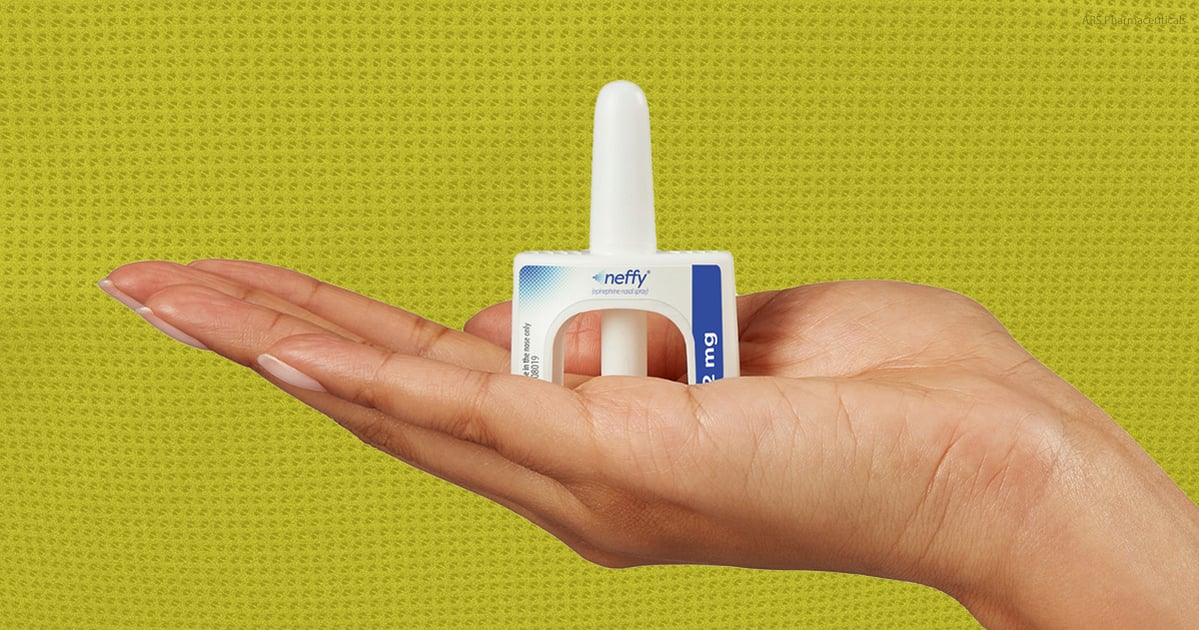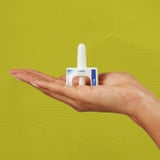Allergic reactions, especially when severe, can be pretty scary. In the case of anaphylaxis, a life-threatening allergic reaction, the treatment typically involves the administration of epinephrine, a drug used to reduce the allergic response, per the Mayo Clinic. Since the 1930s this drug has commonly been administered via an EpiPen to provide life-saving relief – but this can be pretty intimidating, especially for the needle-adverse.
Fortunately, a new medication has been approved by the US Food and Drug Administration: Neffy, an epinephrine nasal spray for the emergency treatment of allergic reactions, including those that are life-threatening.
A nasal spray has many advantages to en EpiPen. “Many who have severe allergies are afraid of needles or scared to inject themselves – this will help eliminate their fear,” says Purvi Parikh, MD, an allergist with the Allergy and Asthma Network. “Also, other caregivers and Good Samaritans may be feel more comfortable using this rather than an injection in an emergency situation, so it can make the drug more quickly used and administered when it’s needed,” she points out. On top of that, she says, Neffy is much smaller than injectable epinephrine devices, making it easy to transport and carry around in your pocket, purse or bag.
But how exactly does Neffy work and when will it be available? Ahead, allergists break down everything you need to know about the new treatment.
Experts Featured in This Article:
Purvi Parikh, MD, is an allergist with the Allergy and Asthma Network.
How Does Neffy Work?
“Neffy delivers epinephrine, the same medication in epinephrine pens and autoinjectors, into your body to stop or slow down [or] counteract a life-threatening allergic reaction,” Dr. Parikh says. It’s a single-dose nasal spray, intended to be administered into one nostril. Epinephrine typically works within five minutes, “which is important as this severe reaction can worsen quickly and be deadly,” Dr. Parikh says. But a second dose of Neffy may be given (using a different spray, in the same nostril), if there is no improvement in symptoms or symptoms worsen, per the FDA.
Side Effects of Neffy
The side effects of Neffy are the same as traditional epinephrine side effects, per Dr. Parikh. This includes jitteriness and palpitations. According to the FDA, other side effects specific to Neffy include:
- Throat irritation
- Tingling nose
- Headache
- Nasal discomfort and congestion
- Fatigue
- Tremor
- Runny nose
- Itchiness inside the nose
- Sneezing
- Abdominal pain
- Gum pain
- Numbness in the mouth
- Nausea
- Vomiting
That said, epinephrine is short acting, so many of these side effects will subside within 30 minutes, Dr. Parikh says. “The trade-off of saving your life is far greater than transient side effects.”
When Will Neffy Be Available?
The medicine received FDA approval on Aug. 9 and is expected to hit the US market in roughly eight weeks, per CNN. The company is also planning to file an FDA approval for a lower-dose version of Neffy for children who weigh between 33 and 66 pounds before October 2024, CNN reports.
What Will Neffy Cost?
The out-of-pocket cost is reportedly $200, according to CBS News. “For people who are on commercial insurance, the cost is going to be limited to about $25,” Céline Gounder, MD, CBS News medical contributor told “CBS Mornings.” For people who are underinsured or uninsured, the medication will be made available for no cost or reduced cost, Dr. Gounder told CBS.
Alexis Jones is the senior health and fitness editor at PS. Her passions and areas of expertise include women’s health and fitness, mental health, racial and ethnic disparities in healthcare, and chronic conditions. Prior to joining PS, she was the senior editor at Health magazine. Her other bylines can be found at Women’s Health, Prevention, Marie Claire, and more.




